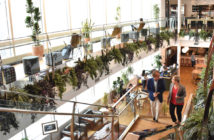How can philosophy, sociology, geographic information sciences (GIS), history, and political science work together to combat emerging public health crises? A group of faculty members and health officials from Southern Africa and the local area spent a week at the University of Redlands analyzing and discussing this very question.
Part of a longer-term alliance, the events were funded by a Hall Network scholarship seed grant, which has supported five University of Redlands professors—Amber Bechard (now at the University of La Verne), Kim Coles, John Glover, James Krueger, and Eric McLaughlin—in creating a Southern Africa Corridor-themed framework for classes, faculty and student research, internships, and other opportunities.
The gathering was also part of the U of R’s efforts to provide students with opportunities to gain a global perspective. “There is inherent value in our students experiencing higher levels of intercultural learning,” says Steve Wuhs, political science professor and assistant provost for internationalization.
The week began with a focus on GIS. Guests from eSwatini (formerly Swaziland) attended Mapping Monday, a series of workshops and discussions hosted by the Center for Spatial Studies, before coming together with colleagues at the GIS hack-a-thon. Participants in the hack-a-thon used real-world data collected by the Tuberculosis Control Program to explore how GIS technologies can be used to improve public health.
“The amazing thing about the hack-a-thon,” says Clement Dlamini, a lecturer and director of the Center for Community Services at the University of eSwatini, “was that the students took our data and, in 45 minutes, presented us with proposals.”
The week culminated with a two-day-long conference, “Southern California, Southern Africa: Place and Practice of Health.” Featuring nearly a dozen presentations from experts on public health, data collection, and GIS, speakers addressed the concepts of infectious disease, philosophy of medicine, information systems, public health, and many other topics.
“It was remarkable the way the talks complemented each other in interesting ways—by raising questions about the importance of institutional relationships and the role those play in defining health in complex multicultural contexts,” says Krueger, who has been leading May Term service-based trips to eSwatini for the
last decade.
Faculty members from the University of Redlands and the University of eSwatini hope to continue their collaboration with additional grant funding and are exploring the possibility of linking students in Redlands and eSwatini using video chat technology.





